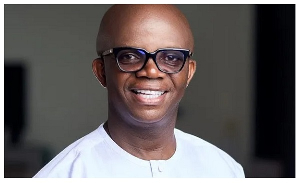Ex gratia payment, end of service issues and entitlements of the former speaker have made headlines in the media and raised public concern about the integrity of government decision-making particularly in procurement and regulatory decisions. The former speaker is alleged to have “looted” his official residence taking away a number of items. After a long silence the former speaker issued a press statement.
I have read with interest the press statement by Hon Sekyi Hughes (Ghanaweb 8 April 2009). In fulfilling the duties owed to the public, Members of Parliament and heads of public corporations are bound to observe high standards of conduct which may sometimes appear to be contrary to their personal self-interest. The maintenance of the highest standards of honesty, integrity, impartiality, and conduct by the Executive, Legislature, Judiciary and government employees and members of boards of government business enterprises is essential to assure the people of the proper performance government businesses and the maintenance of confidence in the activities of government and the judiciary. Integrity implies not only honesty but fair dealing and truthfulness and avoiding conflict between personal interests, or the interests of any associated company, person or group of persons. In this respect, it is important for members to identify occasions when they might be at risk of failing to recognise or conform to any of those standards.
In the press statement the Hon Sekyi Hughes stated that the items he took had been approved by the Parliamentary Services Board as a result of a memo prepared by Kenneth Tachie, Clerk and Head of the Parliamentary Service. The statement noted that during the period the Hon Sekyi Hughes was Chair of the Parliamentary Service Board which is mandated to approve the memo. Most of the people on the Board are also beneficiaries of the proposals put forward by Kenneth Tachie. The statement did not say who chaired the meeting nor did it say who took part in the decision. Did the Hon Sekyi Hughes Chair the meeting? If he did not chair the meeting was he at the meeting and did he take part in deliberations at that meeting?
Conflict of interest situations arise when a person has a personal interest or a direct or indirect financial interest in a matter being considered or about to be considered by a Board. In this situation, it is important that as soon as practicable the member must either disclose that he or she has an interest in the matter and withdraw from the meeting at which the matter is to be considered. He or she must not be present during a deliberation of the board in relation to the matter or take part in a decision of the board in relation to the matter. In some cases a Board may decide whether to allow the member who has an interest in the matter to be present but any decision to allow the member with an interest to be present must be taken when the member with interest is not present. If the Hon Sekyi Hughes took part in the deliberations even if he did not take part in the decision then he was in a conflict of interest situation. There was a real or perceived conflict of interest. Hon Sekyi Hughes was not alone in this, the majority leader, minority leader and the Clerk who prepared the memo all stood to gain from the decision and should not have participated in that part of the meeting that discussed their entitlements.
This issue brings to the fore how to properly identify and manage conflict of interest situations. If conflict of interest situations or not properly identified and properly managed they could seriously endanger the integrity of government and organisations and result in corruption in the public sector and private sector alike. I believe this is the source of some of the problems in Ghana. It appears to me that there appears to be weaknesses in the controls that most organisations in Ghana use to avoid or mitigate the risk of potential situations of conflicts of interest. I will recommend that Government take steps to ensure all organisations, boards obtain signed conflict of interest certifications from all members on the Board and that at each meeting of a Board a conflict of interest declaration be made.
Ebenezer Banful Canberra
Opinions of Sunday, 26 April 2009
Columnist: Banful, Ebenezer
RE: Former Speaker breaks silence
Entertainment

















